抗菌药物管理干预对越南地区医院抗菌药物消费和适宜性的影响:一项聚类随机试验
IF 8.1
1区 医学
Q1 HEALTH CARE SCIENCES & SERVICES
引用次数: 0
摘要
适当使用抗菌素是导致抗菌素耐药性的一个关键因素。抗菌素管理(AMS)促进明智地使用抗菌素来解决这一问题。本研究评估了AMS项目对越南地区医院抗菌药物处方实践的影响。方法在越南北部和南部16个地区医院进行为期4个月的整群随机对照试验。医院被随机分配到干预组和对照组。干预措施包括建立医疗辅助队委员会和小组,分发抗菌素指南,培训卫生保健工作者,提供患者教育材料,并对抗菌素处方进行定期审计反馈。共同主要结局是干预前后干预组和对照组之间在(i)抗菌药物总消费量和(ii)根据标准化指南开具的不当处方方面的“差异中的差异”。次要结局包括抗菌素费用和全因死亡率。干预期结束后,对照组也接受AMS程序。试验注册:澳大利亚和新西兰临床试验注册(ANZCTR)编号12622000715774。结果干预医院在基线和干预后共审查了877张和1220张抗菌药物处方,对照医院分别审查了1277张和1454张抗菌药物处方。在基线时,每家医院不适当的抗菌药物处方超过60%。干预后,干预组的不当处方相对于对照组减少了6.3% (95% CI - 10.9%, - 1.7%)。两组间抗菌药物总消耗量没有差异,但干预组的抗菌药物费用有所降低。全因死亡率无差异。解释辅助医疗服务干预措施适度减少了越南地区医院不适当的抗菌药物处方,强调了辅助医疗服务在资源有限环境中的重要性。资助澳大利亚外交和贸易部。本文章由计算机程序翻译,如有差异,请以英文原文为准。
The effect of antimicrobial stewardship interventions upon antimicrobial consumption and appropriateness in Vietnamese district hospitals: a cluster randomised trial
Background
Inappropriate antimicrobial use is a key driver of antimicrobial resistance. Antimicrobial stewardship (AMS) promotes the judicious use of antimicrobials to address this problem. This study evaluated the effect of an AMS program on antimicrobial prescribing practices in district hospitals in Vietnam.
Methods
A cluster randomised controlled trial was conducted in 16 district hospitals in northern and southern Vietnam over four months. Hospitals were randomly assigned to intervention or control groups. Interventions included establishing AMS committees and teams, distributing antimicrobial guidelines, training healthcare workers, providing patient educational material, and conducting periodic audits with feedback on antimicrobial prescribing. Co-primary outcomes were the “difference in differences” in (i) total antimicrobial consumption and (ii) inappropriate prescribing according to standardised guidelines, before and after the intervention, between intervention and control groups. Secondary outcomes included antimicrobial costs and all-cause mortality. After the intervention period, control sites also received the AMS program. Trial registry: Australia and New Zealand Clinical Trials Registry (ANZCTR) number 12622000715774.
Findings
A total of 877 and 1220 antimicrobial prescriptions were reviewed in intervention hospitals, and 1277 and 1454 prescriptions in control hospitals at baseline and post-intervention. Inappropriate antimicrobial prescribing exceeded 60% in each hospital at baseline. After the intervention, inappropriate prescribing in the intervention group reduced by 6.3% (95% CI −10.9%, −1.7%) relative to the control group. Total antimicrobial consumption did not differ between groups, but antimicrobial costs reduced in the intervention group. No difference in all-cause mortality was observed.
Interpretation
AMS interventions modestly reduced inappropriate antimicrobial prescribing in district hospitals in Vietnam, underscoring the importance of AMS in resource-limited settings.
Funding
The Australian Department of Foreign Affairs and Trade.
求助全文
通过发布文献求助,成功后即可免费获取论文全文。
去求助
来源期刊

The Lancet Regional Health: Western Pacific
Medicine-Pediatrics, Perinatology and Child Health
CiteScore
8.80
自引率
2.80%
发文量
305
审稿时长
11 weeks
期刊介绍:
The Lancet Regional Health – Western Pacific, a gold open access journal, is an integral part of The Lancet's global initiative advocating for healthcare quality and access worldwide. It aims to advance clinical practice and health policy in the Western Pacific region, contributing to enhanced health outcomes. The journal publishes high-quality original research shedding light on clinical practice and health policy in the region. It also includes reviews, commentaries, and opinion pieces covering diverse regional health topics, such as infectious diseases, non-communicable diseases, child and adolescent health, maternal and reproductive health, aging health, mental health, the health workforce and systems, and health policy.
 求助内容:
求助内容: 应助结果提醒方式:
应助结果提醒方式:


